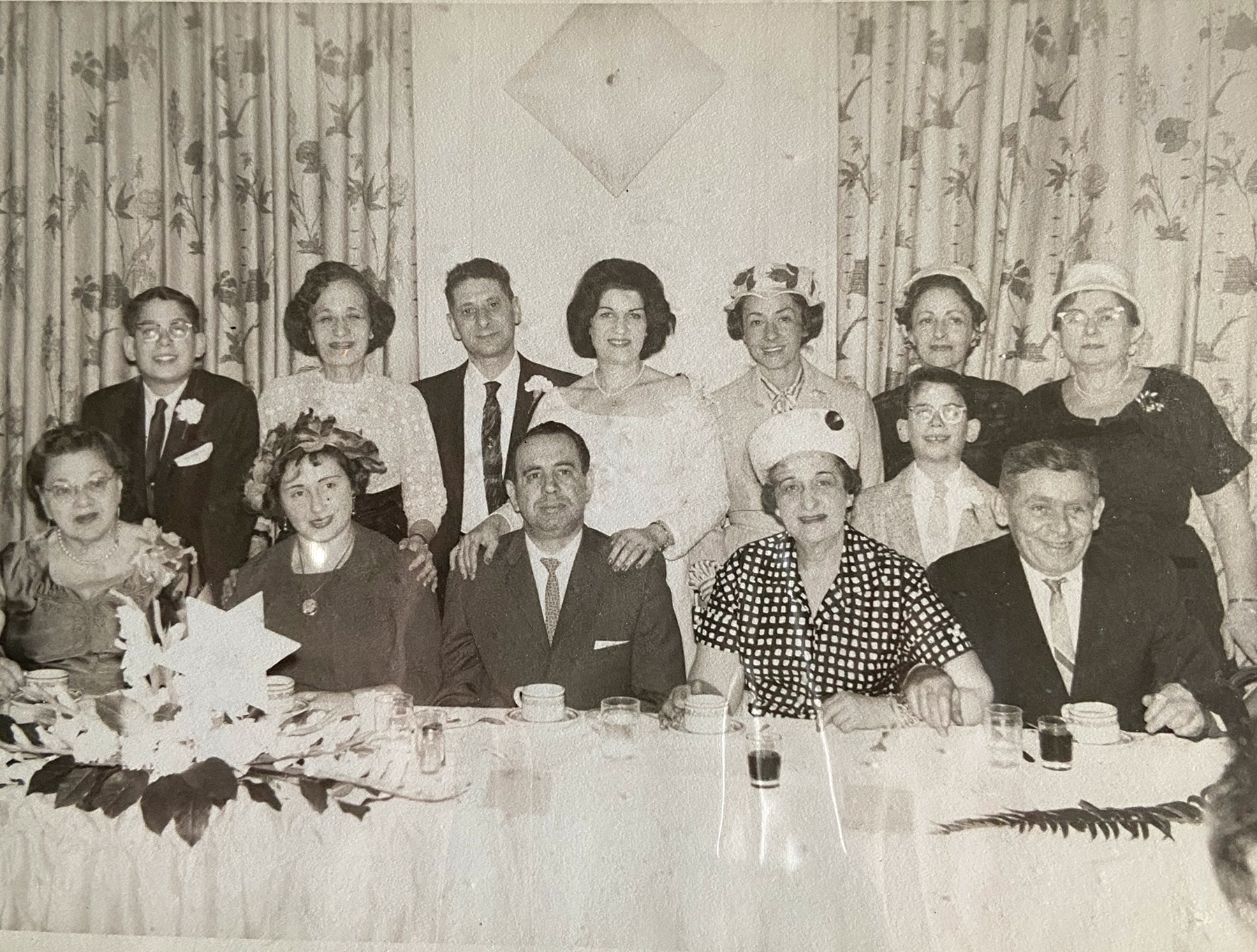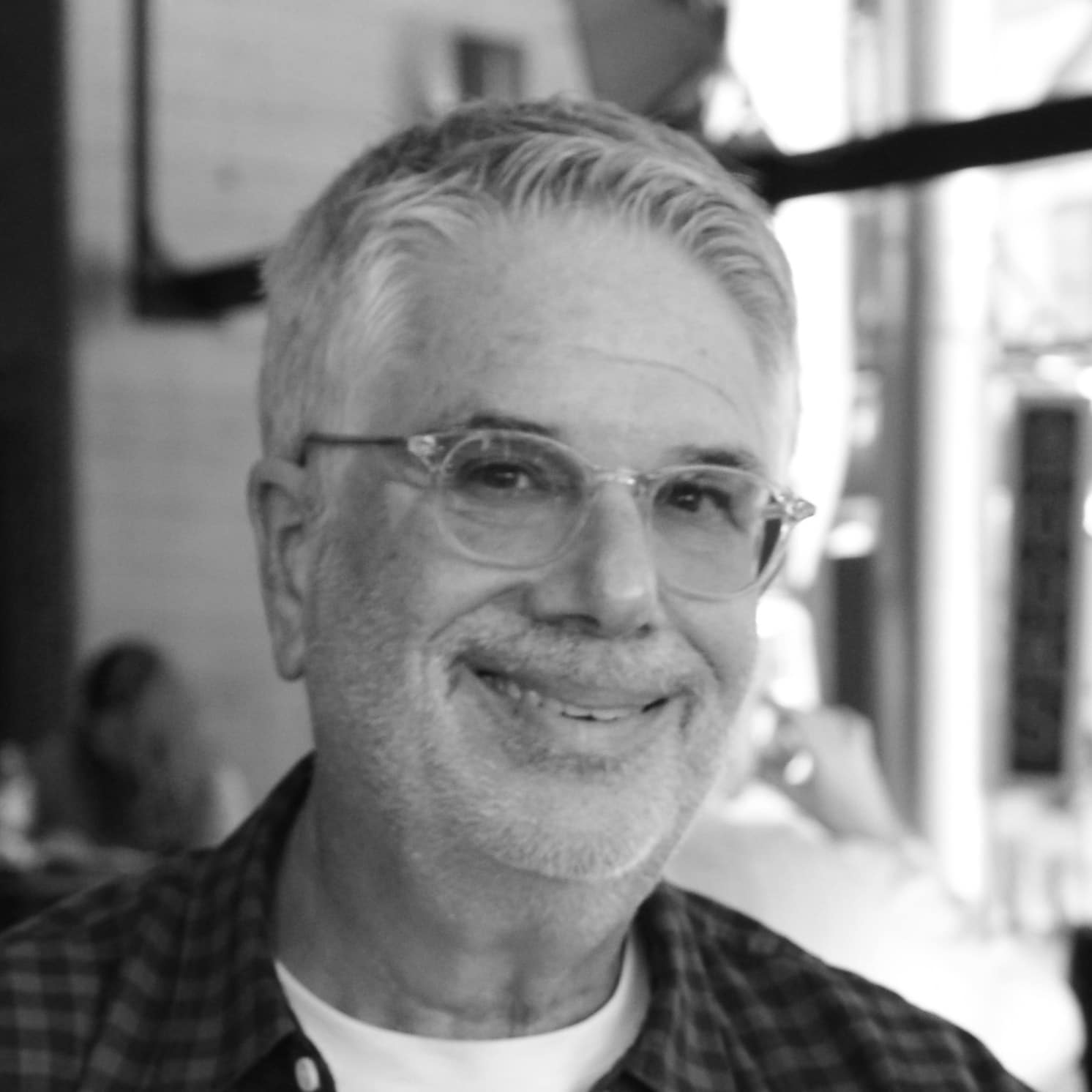 Gary Wexler, in 1961 as a little boy on the right, at his brother’s bar mitzvah with his parents, his mother’s four sisters and relatives who came from Caracas, Venezuela.
Gary Wexler, in 1961 as a little boy on the right, at his brother’s bar mitzvah with his parents, his mother’s four sisters and relatives who came from Caracas, Venezuela. In the years just before World War I, my grandparents, along with their siblings and many members of their extended families—all of whom lived in shtetls along the Bug River bordered by Poland and Belarus—fortunately fled Europe. They settled in two very disparate places, Chicago, Illinois and Caracas, Venezuela. This year, during the pandemic, the descendants have come back together. And for the first time in one hundred years, we will celebrate Rosh Hashana several days early as one reassembled family. From Los Angeles to Chicago to Rhode Island to Texas to Massachusetts to New York to Florida to Venezuela to Columbia to Israel to Canada.
This is not a story about finding each other through ancestors.com. It’s better than that: it’s a testimony to my grandparents and their siblings, to my mother and her four sisters, and to their Venezuelan first cousins, all whom were committed to maintaining the family through the generations, regardless of where they were. These ties were just about lost in my generation. But the pandemic is proving to have a silver lining. It’s bringing us back together.
Among my earliest memories are the gatherings at my grandfather’s apartment in Chicago as he read aloud a newly-arrived Yiddish letter from Caracas to his five daughters, who would translate for the fourteen children—me, my brother, and our first cousins. At other gatherings, my mother and aunts would read aloud the stilted English letters they had received from their generation of relatives. Later, when my grandfather died, Yiddish letters from the older generation of the Venezuelan family continued to arrive. I’d be sent to the door of Mrs. Adler downstairs, who came from the same area of shtetls, the Chicago remnants all lived in our neighborhood, and she’d excitedly huff and puff, climbing the stairs to translate the words of the friends she’d had grown up with and hadn’t seen in decades. My mother would listen attentively, take notes, and then call her sisters and cousins.

Over the years, a few of our Venezuelan cousins had come to visit Chicago. Those visits had been preceded by months of anticipation. They were emotional reunions with people I had never seen but knew through stories, letters, and names. I remember hearing the yells, “Jag sie masz” and learning it was Polish for the Yiddish words that proceeded them, “Voos machst du?”—how are you?” We had no common language, but we had a common bond. We knew we were family. We all shared the cultural touchstone that nothing was more important than this family. My mother and her four sisters told us this every day, wagging their fingers in our faces so we wouldn’t forget. They demonstrated this bond, as they were like five interchangeable mothers to me and to my first cousins. We were raised more like brothers and sisters than like the children of different women.
Years went by. Most of my mother’s generation died. My generation was busy with their own kids and grandchildren. The connection frayed.
Once my grandparents’ generation died, my mother’s generation in the United States and Venezuela continued to maintain the bond. But when I was in my early-forties, I realized that no one in either place was extending the relationship to the next generation, even though we talked about each other often. I knew that once our mothers died, this natural connection would whither.
About thirty years ago, at my parents’ house for Shabbat dinner, I saw an invitation tacked to their refrigerator for a wedding in Caracas. My mother and aunts and their Venezuelan cousins stayed in touch mainly through bar mitzvah and wedding invitations, as well as through the black and white photos of these events that they sent to each other. I read the invitation and told my parents, “We’re going.” A few weeks later, I, my wife, our three kids, and my parents flew to Florida, where we met two of my aunts who had flown from Chicago, in the airport. And then we all flew to Caracas.
Upon landing in a terminal where soldiers carried machine guns amidst strange Latin American smells and colors, my wife turned to me and said, “Where are we?” We grabbed our kids close. I leaned into her ear. “I’m glad my grandparents were the ones who made it to America.”
We traveled to an apartment complex where many members of the family lived. Cousins began pouring in, featuring the ones who I had met in my youth in Chicago alongside a Ricardo, a Carlotta, a Leonardo, a Mario, and a Diana. We looked like one another. The conversation flew by in Yiddish, Spanish, English, and Hebrew. Our connection was undeniable: my mother’s first cousins looked like her and her sisters; on the walls were pictures of my wedding, my brother’s wedding, and my cousins’ weddings; on the shelves were many of the same chachkes my mother and aunts had on their shelves. I had been looking forward to Venezuelan food, but instead I was served the exact same blintz, kugel, and fruit compote recipes my mother and aunts made. As I got to know my cousins, we realized that we were indeed family, sharing many of the same traits—and mishigas. But we also shared many of the same passionate Jewish involvements. I discovered that the Venezuelan family on my grandmother’s side and I shared the same mystical and spiritual Jewish interests.
From that trip on, I took on the responsibility of keeping the connection between the next generation. Years went by. Most of my mother’s generation died. My generation became busy with with own kids and grandchildren. The connection frayed.
Until four years ago in Jerusalem.
Every year, I attend Mekudeshet, the Jerusalem Sacred Music Festival that takes place at different sites throughout the city the week before Slichot. I rarely go on my Facebook page, but that week, I went to a yoga class whose schedule was on Facebook. When I opened Facebook, I saw a minutes-old post featuring a photo of my Venezuelan cousins Sarah and Diana in Tel Aviv. I sent them a message with my phone number, and moments later I got a screaming, crying call in Spanish. Sarah and Diana, who are sisters, were in Israel because Sarah’s daughter was getting married Tuesday night in Jerusalem. “You must come to the wedding,” they insisted. I joyfully accepted.
We were like an electrical cord had been severed then intertwined back together; on Zoom, we witnessed all the extinguished lights turn back on.
On Tuesday, I walked into the top-floor wedding hall at Hebrew Union College and was put at the head table. Everyone was excited to see me, and I discovered that there were scores of my Venezuelan cousins—all my kids’ ages—who are now living in Israel. “I thought I had no relatives in Israel,” I told them.
“We are your family in Israel,” they responded.
After the chupah, Sarah and I walked outside to the balcony overlooking the Old City. Sarah said to me, “One extended family left Poland a hundred years ago and went to two places in the world, Caracas and Chicago. And today, here, we are reunited again as one family at my daughter’s wedding in Jerusalem.” She and I both broke into tears.
Now when I’m in Israel, I have Shabbat dinners with my Venezuelan family. It has put me back in touch with them. Many of my cousins have fled Venezuela—like our grandparents fled Europe—and are now all over the world.
A few months after the pandemic began, I sent an email to all my first cousins in the United States. “This pandemic,” I said to them, “can be pretty lonely. We can’t get on planes and see each other. What if I put together a Zoom?”
Several of them wrote back, “It’ll never work. It will be chaos.” But I got a few cousins to say yes, and that forced all of them to finally agree. On the first Zoom, we were so happy to be with one another that we invited some of our third cousins in America to join the next Zoom. All summer long, we’ve had family Zoom calls, where we actually get into substantial conversations over family, politics, the pandemic, and the economy. We tell stories about our mothers and fill in the holes we kept from one another over the years. One month ago, I suggested, “What if I invite a few members of the Venezuelan family to join?”
It took some convincing with my Venezuelan cousins. I began first with a few still in Venezuela and several now in Bogota, Colombia. They were reluctant. “The wifi here isn’t so good. The Government will listen in. I can’t get Zoom to work from here.” But I pushed, and a few showed up. It was emotional beyond belief. One Venezuelan cousin shared stories about our grandparents and our mothers coming to Caracas. He talked about his excitement as a child surrounding the visits, so similar to how we felt about them when they came to Chicago. We were like an electrical cord that had been severed then intertwined back together; on Zoom, we witnessed all the extinguished lights turn back on. The family reunion photos that had been handed down to us from all our parents are still being scanned and flying back and forth on email.
This week, we will be having a pre-Rosh Hashana Zoom with even more Venezuelan cousins participating. My cousin Jacobo (who is in Caracas) and I discovered we are both serious Torah learners, so he and I have prepared a five-minute Rosh Hashana-related talk to start off the Zoom. We may even blow a shofar.
Jacobo will talk about the month of Elul. I’ll talk about the line after the shofar blasts, “Hayom Harat Ha’olam. Today is the birthday of the world.” My next line will be, “This is the birthday, after one hundred years, of our family coming back together.”
And it will keep expanding. Soon, we will all bring our children and grandchildren to the Zoom.
This Rosh Hashanah, even with the pandemic on Earth, our grandparents, their brothers, sisters, and cousins, and my mother and her five sisters will have reason to be dancing in Heaven.
Gary Wexler is an adjunct professor in the master’s in communication program at the USC Annenberg School for Communication and Journalism.























 More news and opinions than at a Shabbat dinner, right in your inbox.
More news and opinions than at a Shabbat dinner, right in your inbox.